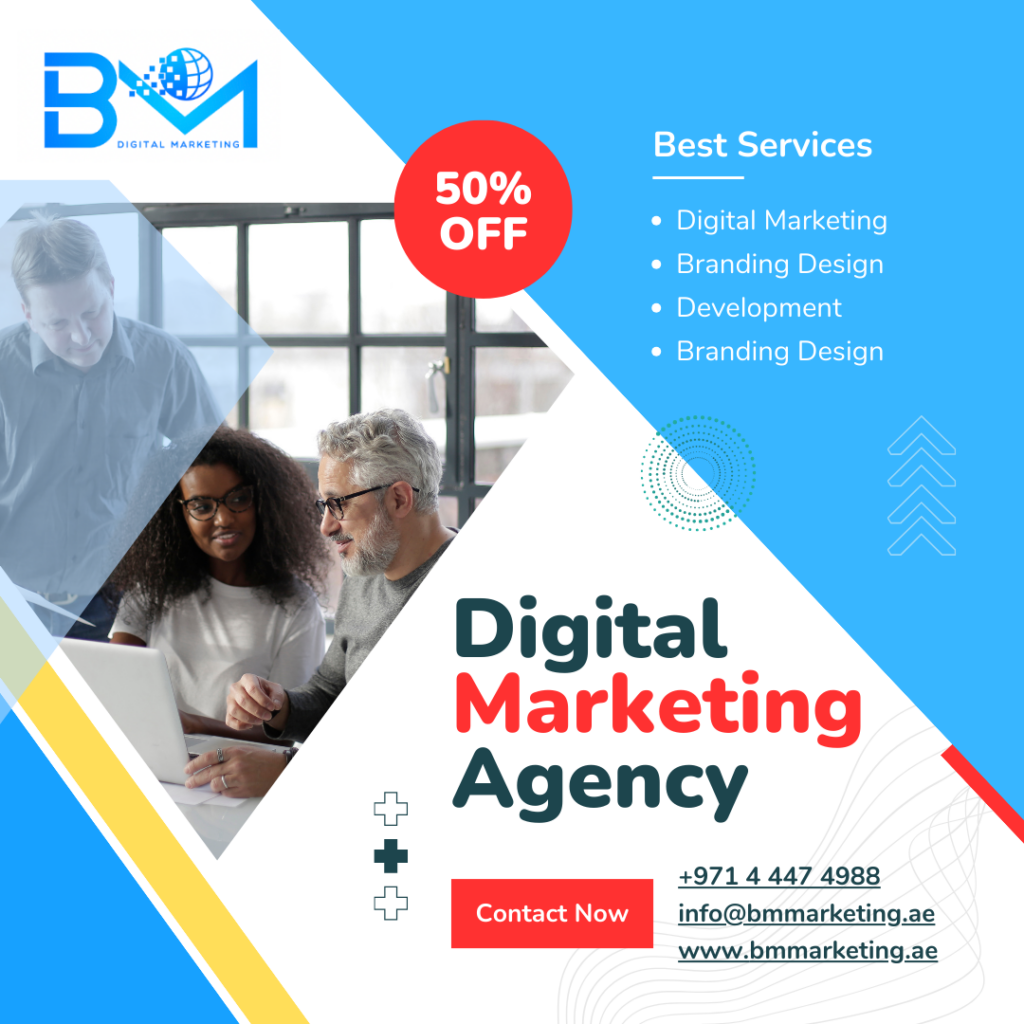Dubai, a bustling metropolis known for its futuristic architecture, luxury shopping, and vibrant culture, is also home to a thriving digital marketing scene. As businesses increasingly recognize the importance of a strong online presence, the demand for top-notch digital marketing services has surged. Whether you’re a local business or a multinational corporation, finding the right agency to boost your brand’s visibility and drive results is crucial.
In this comprehensive guide, we’ll explore the 12 best digital marketing agencies in Dubai. These agencies have demonstrated excellence in their field, combining creativity, data-driven strategies, and innovative approaches to deliver outstanding results for their clients.

1. BM Digital Marketing Agency Dubai
Mr Creative Social is a standout agency that has carved a niche for itself in Dubai’s digital landscape. With a team of seasoned professionals, they offer a wide range of services, including social media marketing, content creation, Local SEO Dubai, and website designing. What sets them apart is their commitment to tailored solutions – they take the time to understand each client’s unique needs and create customized strategies that drive engagement and conversions.
2. Digital Ninja
Digital Ninja lives up to its name by wielding cutting-edge techniques to elevate brands. Their expertise lies in PPC advertising, influencer marketing, and e-commerce optimization. They’ve worked with both local startups and global giants, consistently delivering impressive ROI.
3. Red Berries
Red Berries is all about creativity and innovation. Their services span web development, branding, and content marketing. Their client roster includes diverse industries, from hospitality to tech, and they’ve won accolades for their visually appealing campaigns.
4. Sandstorm Digital
Sandstorm Digital focuses on data-driven strategies. They excel in SEO, SEM, and analytics, helping businesses climb search engine rankings. Their analytical approach ensures measurable results.
5. BeOnTop
BeOnTop thrives on innovation. Their services include web design, mobile app development, and social media management. Their team of experts keeps up with industry trends to keep clients ahead of the curve.
6. Traffic
Traffic is a full-service agency that covers all bases – from SEO and PPC to email marketing and conversion rate optimization. Their holistic approach ensures seamless integration across channels.
7. Nexa
Nexa is known for its strategic thinking. They offer services like inbound marketing, web development, and CRM implementation. Their client-centric approach has earned them a loyal clientele.
8. Digital Farm
Digital Farm specializes in branding and creative campaigns. Their team crafts compelling narratives that resonate with audiences. They’ve worked with startups, SMEs, and Fortune 500 companies.
9. Prism Digital
Prism Digital combines art and science. Their services include social media management, web development, and lead generation. They’re known for their ROI-focused strategies.
10. McCollins Media
McCollins Media believes in bold creativity. Their portfolio includes video production, influencer marketing, and event management. They’ve worked with luxury brands and startups alike.
11. Branex
Branex is a global agency with a local touch. Their services encompass UI/UX design, app development, and digital strategy. They prioritize user experience and aesthetics.
12. Digital Poin8
Digital Poin8 is a multilingual agency that caters to diverse audiences. Their offerings include SEO, social media, and e-commerce solutions. They bridge cultural gaps with finesse.
How do I choose the right digital marketing agency for my business?
Selecting the right digital marketing agency for your business is a critical decision that can significantly impact your brand’s success. Here are some essential steps to guide you in making an informed choice:
- Define Your Goals and Objectives:
- Clarify your business objectives. Are you aiming for increased website traffic, lead generation, brand awareness, or more sales? Knowing your goals will help you find an agency that aligns with your vision and can deliver the desired results.
- Set a Budget:
- Allocate a budget for your marketing efforts. Consider your industry, business type, and specific objectives. A local shop owner, for instance, might focus on targeted local ads and local SEO to enhance awareness in their specific location.
- Conduct Research and Shortlist Prospects:
- Research digital marketing agencies in your area. Look for agencies with expertise in your industry and a track record of successful campaigns. Shortlist potential matches based on their services and reputation.
- Check Their Portfolio and References:
- Review the agencies’ portfolios to assess their expertise and the quality of their work. Ask for references or case studies to understand their past performance and client satisfaction.
- Evaluate Experience and Reputation:
- Consider the agency’s experience. How long have they been in the industry? Do they have a good reputation? Look for reviews and testimonials from previous clients.
- Meet and Interview:
- Arrange meetings with the shortlisted agencies. Discuss your goals, expectations, and any specific challenges your business faces. Gauge their understanding and communication style.
- Request Detailed Proposals:
- Ask the agencies for detailed proposals. These should outline their strategies, tactics, timelines, and estimated costs. Compare the proposals to find the best fit for your business.
What are some common mistakes to avoid when hiring a digital marketing agency?
When it comes to hiring a digital marketing agency, avoiding common pitfalls is crucial to ensure a successful partnership. Let’s explore some of these mistakes and how to steer clear of them:
- Lack of Clear Goals and Expectations:
- Imagine setting sail without a destination. Similarly, not having well-defined goals and expectations can lead to confusion and ineffective collaboration. Before hiring an agency, clearly outline your objectives – whether it’s increased website traffic, lead generation, brand awareness, or sales growth.
- Not Researching an Agency’s Credentials:
- Don’t skip the due diligence. Research the agency thoroughly. Look into their track record, client testimonials, case studies, and industry expertise. Ensure they align with your business needs and values.
- Not Communicating Properly:
- Effective communication is the cornerstone of any successful partnership. Clearly express your requirements, preferences, and any challenges your business faces. Regular communication ensures everyone is on the same page.
- Unrealistic Expectations:
- While digital marketing agencies can work wonders, expecting overnight miracles is unrealistic. Understand that results take time. Set realistic expectations and allow the agency to implement strategies and measure progress.
- Overlooking the Importance of a Well-Defined Contract:
- Contracts protect both parties. Ensure your agreement covers services, timelines, deliverables, payment terms, and any other relevant details. A well-defined contract minimizes misunderstandings and sets clear boundaries.
Can you recommend any agencies that specialize in B2B marketing?
If you’re looking for top-notch B2B marketing agencies in Dubai, here are some reputable options to consider:
- Mr Creative Social:
- A standout agency with a commitment to tailored solutions.
- Services include social media marketing, content creation, SEO, and web design.
- !Mr Creative Social
- GCC Marketing:
- Offers corporate branding, web design, eCommerce, mobile app development, and more.
- Known for its professionalism and expertise.
- !GCC Marketing
- Dubai.Marketing:
- Specialists in improving market positioning and successful brand advertising.
- Focuses on local and global markets.
- !Dubai.Marketing
- Digital Poin8:
- A multilingual agency catering to diverse audiences.
- Services include SEO, social media, and e-commerce solutions.
- !Digital Poin8
- Kingsmen Marketing:
- A 360-degree marketing and advertising management company.
- Offers comprehensive B2B marketing services.
- !Kingsmen Marketing
Remember to evaluate each agency based on your specific business needs, goals, and budget. Choose wisely, and may your B2B marketing endeavors thrive.
What are some common pricing models used by digital marketing agencies?
Certainly! When it comes to pricing their services, digital marketing agencies have a variety of options to choose from. Let’s delve into these common pricing models:
- Hourly Rate:
- In this straightforward model, agencies charge clients based on the price of one hour of work. The agency calculates an hourly rate by averaging the value of one hour of work completed by each team member or by determining the rate for a specific service.
- Advantages:
- Straightforward price calculations.
- Easy to explain to clients.
- Perfect for managing limited agency resources.
- Disadvantages:
- Revolves around the agency’s costs rather than the value to the client.
- Places the agency’s profit in opposition to the client.
- Clients may question how much work the agency is actually doing.
- According to a recent survey, the most common hourly rate that digital agencies charge is $150 to $174 per hour.
- Project-Based Pricing Model:
- In this model, the agency estimates the project’s cost by calculating the required hours and multiplying them by the hourly rate per employee or the agency-wide hourly rate. A buffer fee or margin is added to protect profits, and the final fixed amount is billed incrementally.
- Advantages:
- Clients know exactly how much their project will cost.
- Clients are aware of the payment schedules, avoiding financial surprises.
- This model benefits clients who have a budget to adhere to, as they know the project’s exact cost and payment schedule.
- Value-Based Pricing Model:
- Here, the agency charges based on the value delivered to the client. It focuses on the impact of the agency’s services on the client’s business outcomes. The price is determined by the perceived value rather than the hours worked.
- Advantages:
- Aligns with the client’s goals and outcomes.
- Encourages agencies to focus on results.
- Allows flexibility in pricing.
- Disadvantages:
- Requires clear communication about the value proposition.
- May be challenging to quantify value accurately.
- Performance-Based Pricing Model:
- In this model, the agency’s compensation is tied directly to the performance metrics achieved. It could be based on conversions, leads generated, or other measurable outcomes.
- Advantages:
- Strong incentive for agencies to deliver results.
- Risk-sharing with the client.
- Encourages accountability.
- Disadvantages:
- Complex to set up and track.
- Requires well-defined performance metrics.
Remember that the right pricing model depends on your agency’s goals, client expectations, and the nature of the projects you handle. Choose wisely to ensure a successful partnership!
How do I measure the success of a B2B marketing campaign?
Measuring the success of a B2B marketing campaign involves tracking relevant metrics to evaluate its impact and effectiveness. Here are some essential steps and metrics to consider:
- Brand-Oriented Metrics:
- These metrics focus on awareness, relevance, and differentiation:
- Social Engagement: Monitor interactions (likes, shares, comments) on social media platforms.
- Website Traffic: Analyze the number of visitors to your website.
- Branded Search Volume: Track how often people search for your brand name.
- Impressions: Measure how many times your content is displayed.
- These metrics help assess the top part of the marketing funnel and indicate awareness and interest in your business.
- These metrics focus on awareness, relevance, and differentiation:
- Revenue-Oriented Metrics:
- These metrics measure how much of your target audience converts into paying customers:
- Conversion Rate (CVR): Calculate the percentage of leads that become customers.
- Customer Lifetime Value (CLV): Assess the long-term value of a customer.
- Cost of Sales: Understand the expenses related to acquiring a customer.
- Customer Acquisition Costs (CAC): Determine the cost of acquiring a new customer.
- These metrics provide insights into the bottom part of the funnel and revenue generation.
- These metrics measure how much of your target audience converts into paying customers:
- Additional Tips:
- Set Clear Goals: Define specific objectives for your campaign (e.g., lead generation, sales growth).
- Use Marketing Tools: Choose tools that align with your goals and help track relevant metrics.
- Establish a Timeframe: Monitor results over a specific period (weekly, monthly, quarterly).
- Create a Marketing Dashboard: Present your findings visually for easy analysis.
Remember, a successful B2B marketing campaign combines both brand-oriented and revenue-oriented metrics to provide a holistic view of its impact. Regularly evaluate and adjust your strategies based on these insights!

